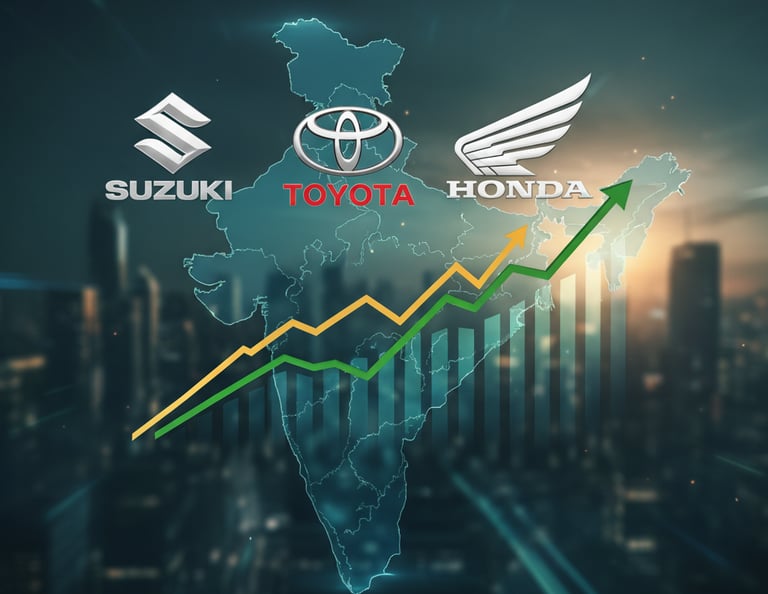Japan's $11 Billion Bet: Why India is Replacing China as Asia's Auto Hub
Signals Vote of Confidence in India's Economic Future


A major shift is underway in the global automotive landscape. Japan's biggest auto majors - Toyota, Honda, and Suzuki - are collectively making one of the largest foreign investment commitments in India’s history, pivoting their manufacturing and export focus away from China. This massive $11 billion commitment is not just a financial pledge; it signals India's emergence as a crucial global manufacturing and export hub.
A Massive Investment: The $11 Billion Pivot
Japanese automakers, historically dominant in Asia, are significantly strengthening their bet on India. Toyota, Honda, and Suzuki are collectively investing nearly Rs. 97,504 crore (US$ 11 billion). This underscores a clear strategy to diversify supply chains and establish a new growth engine outside of China.
Maruti Suzuki's Megascale: Suzuki, which already commands about 40% of India’s car market, is leading the charge with a massive investment of Rs. 70,912 crore (US$ 8 billion). This ambitious plan aims to scale up its annual production capacity to an unprecedented four million vehicles, firmly establishing India as its global production hub for local consumption as well as exports.
Toyota's Hybrid Push: Toyota is adding Rs. 26,592 crore (US$ 3 billion) to its India operations. The investment is targeted at expanding its hybrid component supply chain and building a new manufacturing facility in Maharashtra. By 2030, Toyota plans to launch 15 new or updated models and is targeting a 10% market share.
Honda's EV Export Base: Honda is positioning India as a strategic export hub for its next generation of electric vehicles. The company is set to begin production of its upcoming Zero Series electric cars in India starting in 2027, highlighting the country’s growing role in global EV manufacturing. Honda's CEO, Mr. Toshihiro Mibe, has already highlighted India's importance among the company’s top three markets worldwide.
The China Factor: Declining Profitability amidst Price Wars and Competition
Supportive Government Policies: Supportive policies under Prime Minister Mr. Narendra Modi’s government, including incentives for local manufacturing and a protectionist stance on Chinese EV imports, have made India an exceptionally attractive destination.
Manufacturing and Export Hub: The goal is clear: utilize India's competitive cost structure, large skilled workforce, and favorable trade environment to build cars for the world. Suzuki's aim to make India its global production hub and Honda's plan to export new EVs from the country are prime examples.
A New Growth Engine: With its robust economic growth and burgeoning middle class, India is now strategically positioned as Japan’s next growth engine in the global automobile landscape.
The massive commitment from Toyota, Honda, and Suzuki marks a watershed moment. It signifies the redrawing of global automotive supply chains, with India increasingly replacing China as the preferred strategic manufacturing base for Japanese auto giants. This not only promises a huge boost for India’s manufacturing sector but also signals a powerful vote of confidence in the country's economic future on the world stage.
